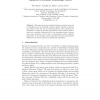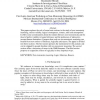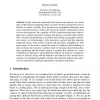22 search results - page 1 / 5 » Reasoning by Assumption: Formalisation and Analysis of Human... |
IWINAC
2005
Springer
14 years 4 months ago
2005
Springer
This paper shows how empirical human reasoning traces can be formalised and automatically analysed against dynamic properties they fulfil. To this end, for the reasoning pattern c...
TPHOL
2009
IEEE
14 years 5 months ago
2009
IEEE
Abstract. We consider a formalisation of a notion of observer (or intruder) theories, commonly used in symbolic analysis of security protocols. An observer theory describes the kno...
JSS
2007
13 years 10 months ago
2007
Large systems often have a long life-span and comprise many intricately related elements. The verification and maintenance of these systems require a good understanding of their ...
LANMR
2004
14 years 5 days ago
2004
This paper explores the role of some basic notions in the study of non-monotonic reasoning, such as validity, logical consequence, context, rules and assumptions.1 It offers some ...
COSIT
2009
Springer
13 years 8 months ago
2009
Springer
People intuitively understand that function and purpose are critical parts of what human-configured entities are about, but these notions have proved difficult to capture formally....



